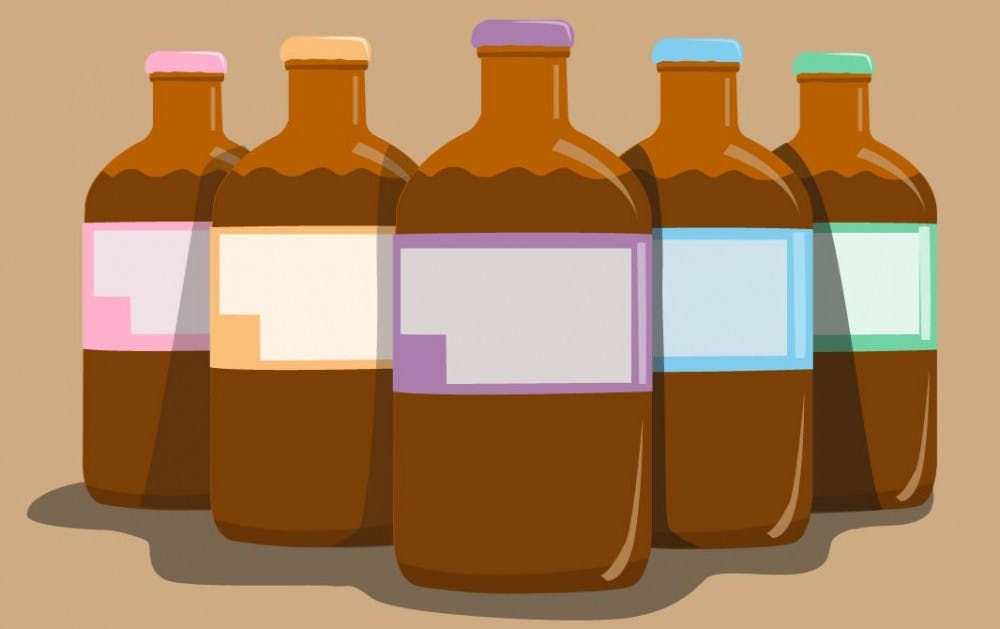The popular fermented beverage kombucha is inspiring new health research and business opportunities at ASU.
Kombucha is an ancient drink composed of sugary green or black tea that is fermented; it provides a sweet and effervescent taste.
It originated in Northeast China in 221 B.C. and has recently become an extremely popular health drink, having the fizz and sweet taste of soda but without the associated health detriments.
Students can find kombucha at the POD markets on campus, as well as any big chain supermarket.
Near ASU's Tempe campus, the Whole Foods opening on Mill will also have a wide selection of the drink, with many locations even serving it on tap.
Doner Dudes located on Vista Del Sol is currently the only on-campus restaurant to sell kombucha to the Tempe ASU community. Employee Eric Montes, who has been at the restaurant since its opening in 2017, says kombucha has been an extraordinarily popular addition to the Tempe Doner Dudes.
“When we first opened the company two years ago, we noticed that only convenience stores rather than actual restaurants sold kombucha,” Montes said. “We wanted to see what the risk would be selling it for students, and so far it’s turned out really well. We get a case of roughly 96 bottles of kombucha total, and we’ll go through all of it in two weeks and have to reorder."
If you come into Doner Dudes at the right time, you might even be able to snag some brewing advice from the founder.
“Our owner, Sancar Dumlupinar, is from Turkey, and he makes kombucha, so he’ll give students tips on making their own when they come in and ask for advice,” Montes said.
Kombucha has recently made a massive comeback in popularity, with nearly 51% of adults aged 25-34 reporting to have drank kombucha in a 2015 survey conducted by Food Markets.
These numbers are expected to rise, as the kombucha market is expected to reach $1.8 billion in sales by 2020, according to Markets and Markets.
Rebecca Kraft, sophomore and computer science major, is a self-proclaimed "kombucha lover."
"I like it because of the health properties and the taste. It reminds me of Sprite, but it is naturally carbonated because it is fermented," Kraft said. "It has probiotics that are great for your stomach, and it makes me feel like my drink has a purpose. I like that I can find kombucha all over ASU. I usually go to the POD Market when I crave one."
Marrisol Sanchez, senior and biochem major, agreed with Kraft.
"For those long study nights when you want something bubbly, kombucha is a much better alternative to soda," Sanchez said. "I like the Wild Tonic brand the most. They're locally based in Cottonwood, Arizona and have kombucha naturally sweetened with honey."
Athena Aktipis, assistant professor in the Department of Psychology, loves kombucha so much that she has studied the fermentation process in order to discover how the drink works.
Aktipis explained the science behind the drink.
"Basically, you have yeast and bacteria working together to process the sugar in the tea and make it into components that create a slightly tangy and acidic flavor in the drink," Aktipis said. "It also adds the effervescent taste of it, as well as a tiny bit of alcohol. These are all created through interaction of yeast and bacteria within the solution."
She also encourages the drink in lieu of more harmful alternatives like alcohol.
"I think there’s an opportunity to rethink our recreational beverages," Aktipis said. "We have a lot of high alcohol concentration beverages: maybe we could do better and encourage drinks that have less alcohol, and more things that can influence health and well being. Future research is definitely needed on the full health benefits of kombucha."
She said her research will study people that consume kombucha and how it affects their stress responses.
Aktipis's lab is also connecting kombucha to important issues, such as drug resistance in the world of health, specifically with human pathogens.
"It might provide a way to develop antimicrobial products and help to protect us from pathogens," Aktipis said. "Given that a lot of drugs, like antibiotics, are vulnerable to the evolution of resistance, and given that kombucha is such a complex ecosystem, it might be less likely to have the problem of resistance and potentially create important medical discoveries."
Reach the reporter at artayl14@asu.edu and follow @abigailtay78 on Twitter.
Like The State Press on Facebook and follow @statepress on Twitter.




